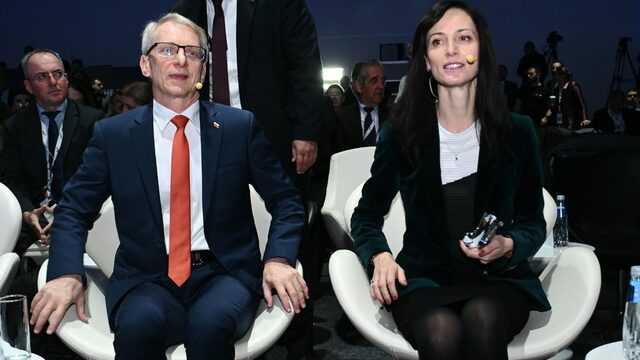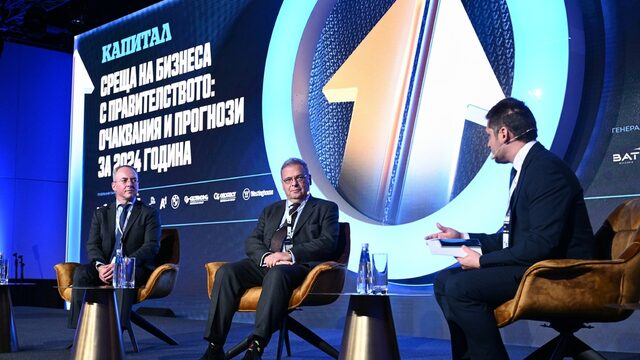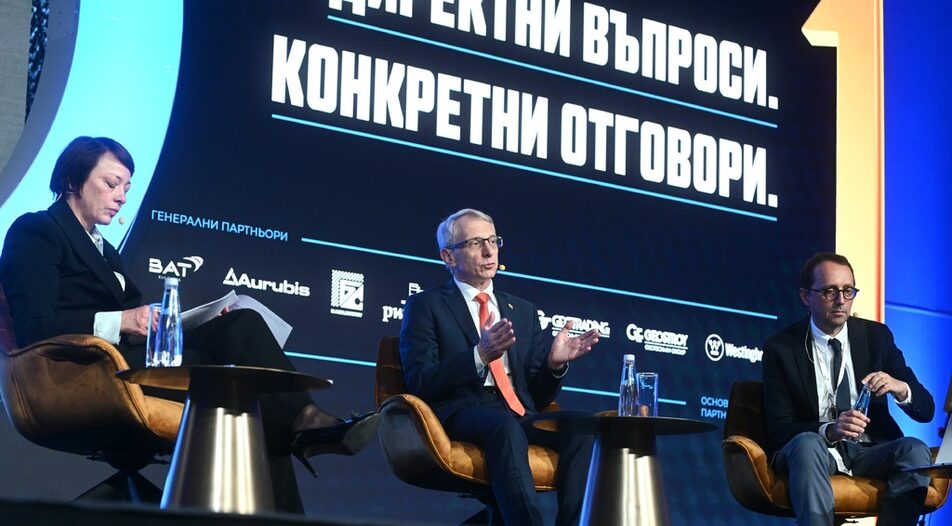Panelists included PM Nikolay Denkov, the likely future PM and current Foreign Minister Mariya Gabriel, the Ministers of Environment Julian Popov, of Innovation Milena Stoicheva, of Economy Bogdan Bogdanov, the Deputy Minister of Finance Georgi Klisurski, of Energy Krasimir Nenov, political scientist Ivan Krastev, prof. Luke van Gool and prof. Martin Vechev from the Bulgarian Institute for Artificial Intelligence INSAIT and others.
The initial horizon for the existence of the Denkov-Gabriel rotational cabinet is until the end of 2024, but it might last beyond that, PM Nikolay Denkov told the audience of the 17th annual business-government meeting organized by Capital weekly.
The conference started with Denkov defining the government's priority policies and reforms, and continued with Foreign Minister Maria Gabriel's discussion of forthcoming important goals after the cabinet rotation. It was followed by a presentation from political scientist Ivan Krastev on the implications of different possible war exit scenarios, the losers and winners in the world and Europe in 2024. The next topics were the Macro-framework and Budget, which featured a presentation by Deputy Minister of Finance Georgi Klisurski, followed by a panel on Bulgaria and the Green Transition, which saw interventions by Environmental Minister Julian Popov and Deputy Energy Minister Krasimir Nenov.
PM sets out three sets of priorities
PM Nikolay Denkov outlined three sets of priorities for the cabinet. The first is the improvement of Bulgarian institutions, whose reforms have been delayed for years - the justice system, the state and regional administration, which should be digitized, as well as education and healthcare.
Second are activities linked to the integration of the country into the various international institutions, with priority given to Schengen and the Euro area, but also the Organisation for Economic Co-operation and Development (OECD), some UN structures and others.
Third, the PM spoke about the modernization of the Bulgarian economy, with focus on the goal of making Bulgaria competitive in the field of the most modern and challenging industries. "In order to develop the institutions and integrate well internationally, we need to stabilize the political situation," Mr Denkov pointed out.
How does the rotational cabinet take decisions?
The rotating PM explained that he and Ms Gabriel discuss all important issues to ensure both support from the parties in parliament and continuity after the rotation. Mr Denkov underlined how, under the new rotational principle, the country has successfully replaced the one-person governance model of the state of former PM Boyko Borissov and subsequently inherited by the president during his caretaker governments. In his words, there is currently a good dialogue between the Council of Ministers and the National Assembly, and, as an example, he noted the decision to revoke Lukoil's concession of the Rosenets refinery.
The PM commented that the only institution currently not involved in this attempted dialogue is the presidency. "With the [geopolitical] situation developing around us, this is quite harmful," Mr Denkov said, referring to international tensions and conflicts.
How can the corrupt appoint anti-corruption fighters?
The current authorities realize the importance of reforming regulatory bodies to boost the business climate. But they are also eager for this reform not to remain only on paper. In this context, Mr Denkov emphasized the quality of the selection of people: "we realize that it is not enough to change the laws, to improve the constitution, the key is the appointees to the relevant positions [in the regulators]."
He said the ultimate goal is to get people with both expert and moral qualities into the various institutions. Hence a different nomination process is already being set up, he said, citing the way the anti-corruption commission is constructed, adopted with the new Anti-Corruption Law. "A nomination committee is being explicitly created, which will be made up of people from outside parliament, to ensure a transparent and public procedure to evaluate candidates and only then - to present them to the National Assembly," Mr Denkov said. In this way, the government is trying to avoid the previous hidden mechanisms through which people have been appointed to the regulators on the basis of party quotas who have commitments to those who sent them there.
Mr Denkov conceded that the desire for new staff clashed with the reality that the selection would depend on MPs sanctioned for corruption under the Magnitsky Act. But he added that this is how democracy works. "Yes, people sanctioned will approve the nominations for the anti-corruption commission, on the one hand, but on the other, there will be others who will do approvals, too," he concluded.
On the euro and the Russian gas transfer fee
It is "quite realistic", he said, for Bulgaria to join the eurozone by the end of 2025. "We have a stable fiscal situation, we are managing to maintain a 3% deficit. If there is no significant escalation of the conflict in the Middle East and inflation in the country continues to fall in the spring, we will have a good report," the PM said. His words were confirmed later by the Deputy Finance Minister Klisurski.
The PM also commented on Bulgaria's decision to introduce a BGN 20 per MWh charge for the transit of Russian gas, which could provide up to BGN 3 billion a year but puts a financial burden on Serbia and Hungary. "By introducing the Russian gas transmission fee, we are bringing competition back to the market, but we do not aim to raise prices in Serbia and Hungary. The aim is to reduce Gazprom's profit, to reduce the funds that go into Russia's state budget to fight the war in Ukraine," Mr Denkov said.

Deputy PM Gabriel: No migrant pressure from Gaza expected
Foreign Minister and future rotating PM Mariya Gabriel started her speech by saying that with the formation of the current cabinet Bulgaria has clearly demonstrated it belongs to NATO and the EU. This was the leitmotif throughout her speech.
She stressed that Sofia strongly condemns the terrorist attacks by Hamas in Israel. Gabriel, however, believes that the country is not threatened by a migrant wave: "Bulgaria is not the destination for such a migrant flow."

The future of coal and coal regions
Whether coal-fired electricity is good or bad, green or not, it is dying out on the electricity market, and this directly affects the financial performance of coal companies such as the state-owned Maritza-East 2 TPP and state-owned mines. According to Environmental Minister Julian Popov, focusing on whether coal power plants will shut down is the wrong approach entirely.
The only way to overcome these economic processes is to rely on new investments that give a clear perspective to the Stara Zagora region. Of all the protesters who took to the streets in the past few weeks, it is likely that only 20% will be working in the same sector in 10 years, he said. "But the remaining 80% can use their qualifications in the new employment that the energy and technological transition provides," Mr Popov said.
Many of these jobs would be connected to the recovery of the open-air coal mines and, if conducted properly - in the establishment of a new, greener energy infrastructure in their place. All of this would be supported by the EU and its Territorial plans, which - if not utilized, will mean that the regions would remain as they are now, or even worse, because hundreds of millions will be lost, he concluded.
Among other topics at the conference were Bulgaria's capacity to engage in the burgeoning AI revolution, as well as how to unlock the country's investment potential and growth.
Panelists included PM Nikolay Denkov, the likely future PM and current Foreign Minister Mariya Gabriel, the Ministers of Environment Julian Popov, of Innovation Milena Stoicheva, of Economy Bogdan Bogdanov, the Deputy Minister of Finance Georgi Klisurski, of Energy Krasimir Nenov, political scientist Ivan Krastev, prof. Luke van Gool and prof. Martin Vechev from the Bulgarian Institute for Artificial Intelligence INSAIT and others.












